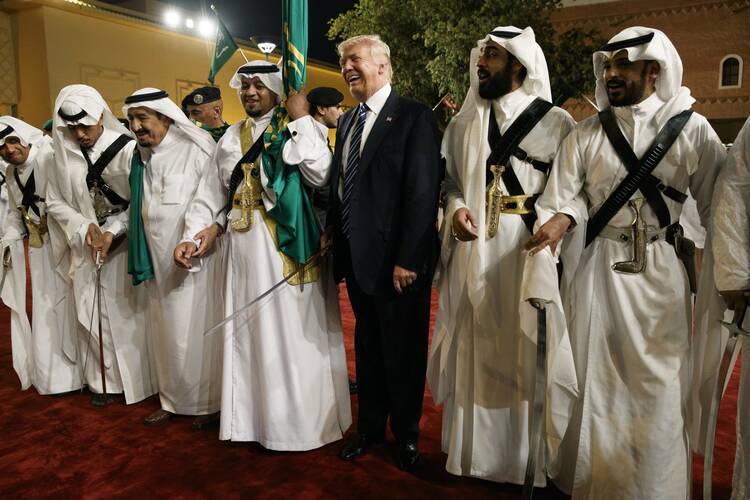The gruesome murder of the Saudi journalist Jamal Khashoggi marked an extreme low point for diplomatic scandal even as it raised the profile of another of Saudi Arabia’s crimes, its similarly sadistic treatment of the people of Yemen. It is disheartening that it has taken the murder of one well-connected media figure to finally force Congress to confront U.S. complicity in the Saudi-led war in Yemen, but so be it. In this era of acute political dysfunction, moments of institutional self-reflection are valuable even when inspired by tragedy.
The United States is being outmaneuvered by Russia and President Bashar al-Assad in Syria, by Iranian mullahs in Iraq and by the Taliban in Afghanistan. The Trump administration has abandoned even the pretense of neutrality in what passes for Israeli-Palestinian dialogue these days, content to cheer on Prime Minister Benjamin Netanyahu and the settler maximalists.
Children not even born when U.S. interventions in Afghanistan and Iraq began will soon be able to enlist in the military, yet the mission and strategy in these traumatized states remain as murky as ever.
Children not even born when U.S. interventions in Afghanistan and Iraq began will soon be able to enlist in the military, yet the mission and strategy in these traumatized states remain as murky as ever. Meanwhile, the guiding principles of current Middle East policy appear to be knee-jerk antipathy toward Iran and unqualified support of Israel and Saudi Arabia, despite their evident contradictions with long-term U.S. interests in regional peace and stability.
The underfunding of the State Department and its marginalization by other players in the administration have degraded U.S. responses to shifting conditions in the region and led to a limited focus on military power and threats. But entrenched conflicts in the Middle East make a mockery of the long-term effectiveness of military might in the service of geopolitical ends.
The apparently state-sanctioned murder of Mr. Khashoggi offers the administration an opportunity to step back and reassess not just its relationship with the Saudi royal family but the overall mission of the United States throughout the Middle East. A rebalancing of diplomatic and military deployment seems warranted, preferably before the next U.S. misstep adds to the region’s too-long-ignored human suffering.










What are we being allowed to know about this? The complexity and depth of the United States-Saudi Arabia relationship is unfathomable, as clearly evidenced by the 9-11 events where nearly all the the airplane hijackers were from Saudi Arabia, and yet the investigation into that country's involvement is completely hidden and deliberately withheld from public view. Did Khashaoggi know a little too much about this, and was that the cause of his demise? Were the events of 9-11 simply the collusion of very high United States and Saudi interests used to justify the invasions of Iraq and Afghanistan? There is a vast and nefarious chasm between what happened and what we are allowed to know.
What are we being allowed to know about this? The complexity and depth of the United States-Saudi Arabia relationship is unfathomable, as clearly evidenced by the 9-11 events where nearly all the the airplane hijackers were from Saudi Arabia, and yet the investigation into that country's involvement is completely hidden and deliberately withheld from public view. Did Khashaoggi know a little too much about this, and was that the cause of his demise? Were the events of 9-11 simply the collusion of very high United States and Saudi interests used to justify the invasions of Iraq and Afghanistan? There is a vast and nefarious chasm between what happened and what we are allowed to know.
Welcome from Florida! I am fatigued to death at the obligation, I immediately resolved to search out your site on my iPhone all through noon break. I like the information you give here and can't hold have a look once I am returning home. I am astonished at how energetically your site stuffed on my phone .. I am not abuse Wi-fi, only 3G. At any rate, decent blog!
Happy Thanksgiving day
This article is actually a nice one it assists new web viewers and people who are wishing to learn blog writing. I have one top recommendation for best writing services for Essay Writing Service UK and Nursing Dissertation help